#why is he saying Baara?
Explore tagged Tumblr posts
Text

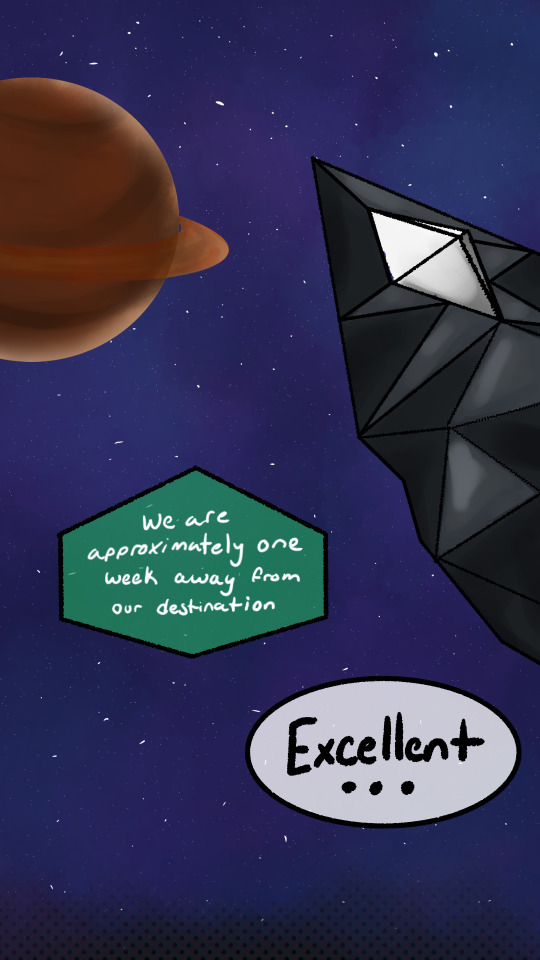

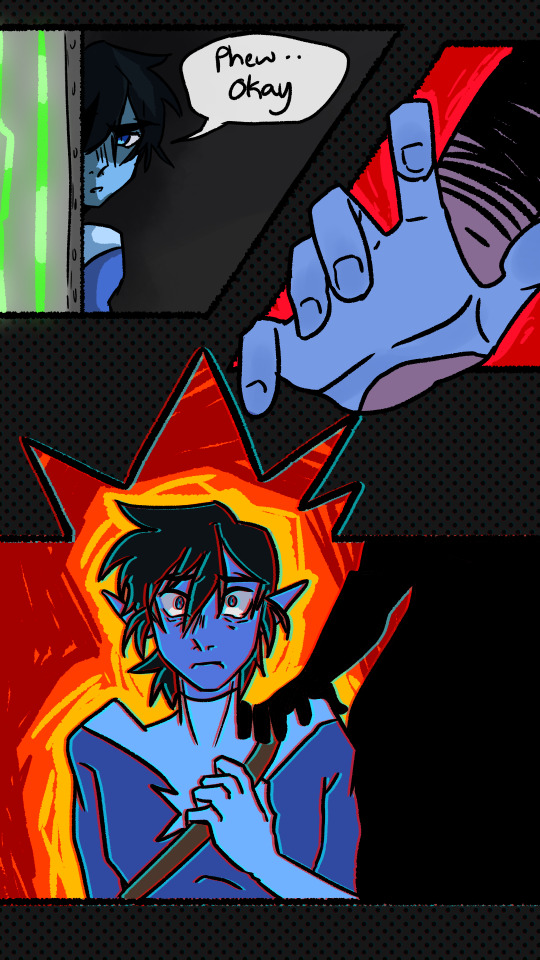
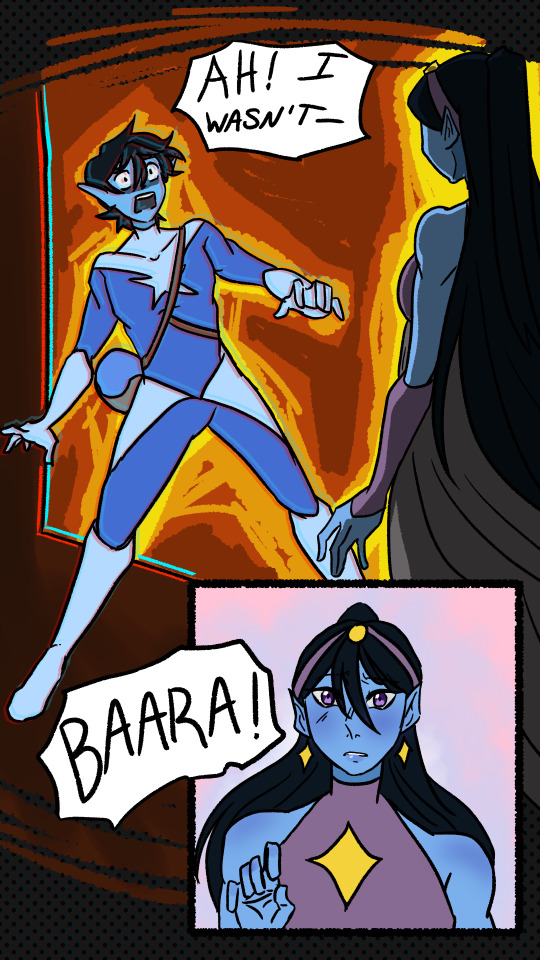
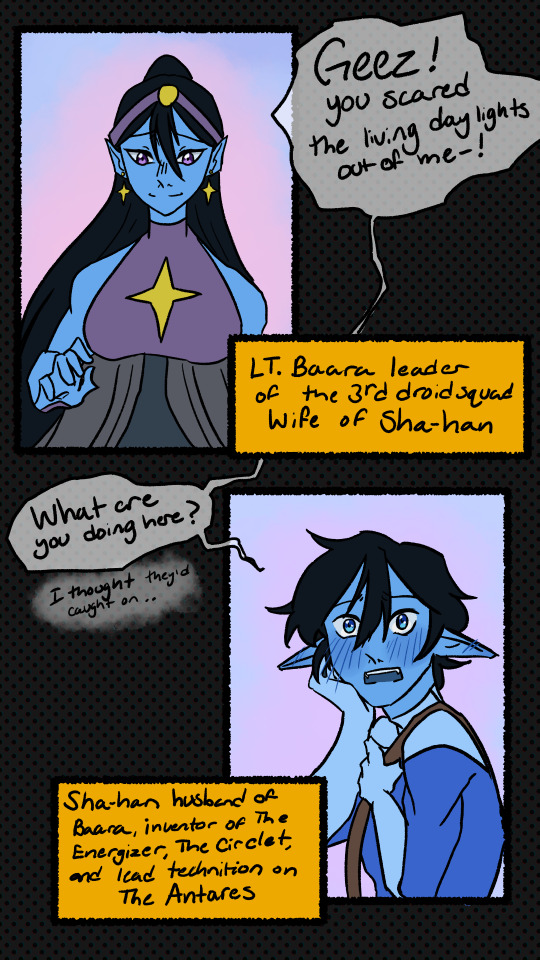
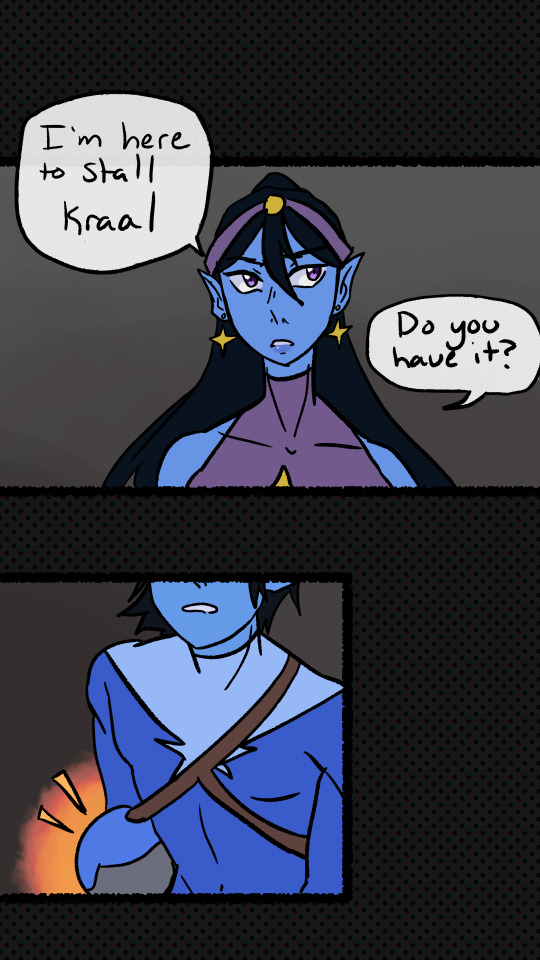
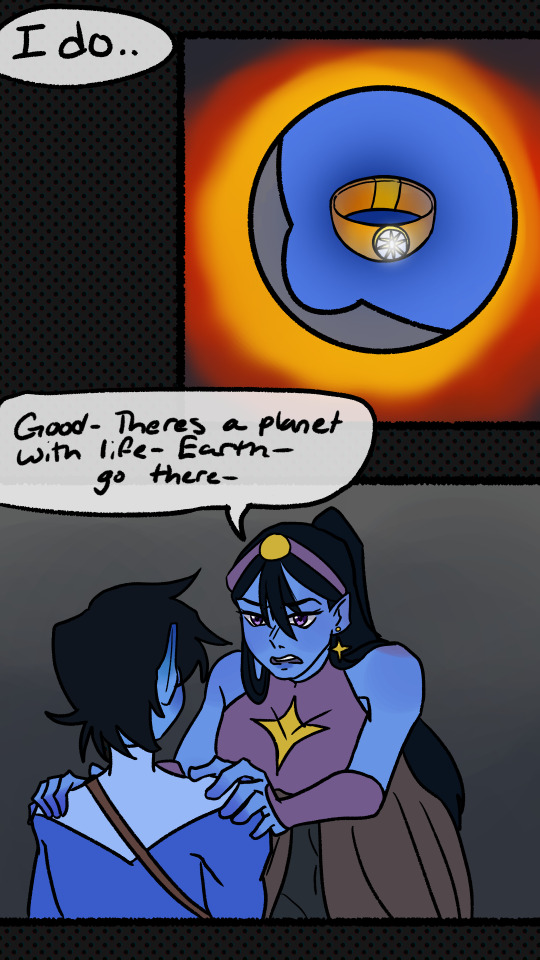

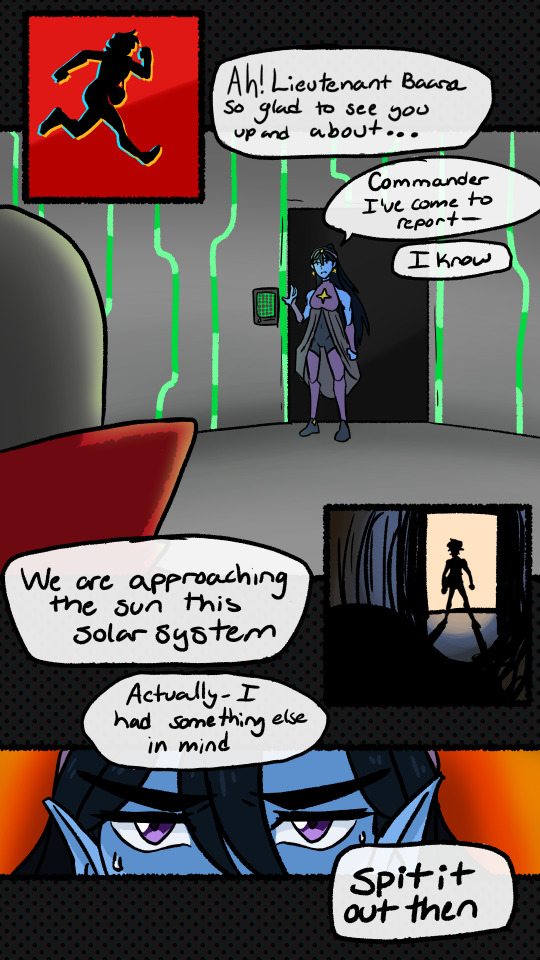
Solarman: Rising
Episode 1: Pilot
Next
read ahead on webtoon!
thanks to @frulleboi for helping with this update and making a page!
#solarman rising#solarman: rising#sman official#solarman#comic#update#gonna update 10 pages at a time probs once a week if im that caught up#while webtoon will update in full once a month if i got that far#comic is hard#also my fav part of working on this was streaming it and having one of my friends be like#why is he saying Baara?#not knowing that thats her name XD#plus getting guest artist to help#its fun!#i love all my friends sm
19 notes
·
View notes
Note
Why that baara and drix be so sultry tho 😳
Also uhh ideal dates for all of them go
1- because they are, that’s very intentional on their parts 😌
2- ideal dates hmmm alright let’s go 🤔
Aedrix: I feel like an deal date for our dear Drix isn’t anything too fancy. They don’t necessarily like staying in, but they’d also be as happy in a public park on a walk as they would be in a five star restaurant. But they do have a favorite time to go out; pretty much all of the dates they plan are late in the evening. They love the cool air of nighttime and how the streets are always more quiet after the sun sets!
Baara: Baara loves to spoil his partners! He loves anywhere he knows they’ll really get into, something engaging! And if that engaging thing is him, showering his loves with kisses while the three of them are relaxing on the sofa, then who’s to say?~ And when I say “spoil” I more mean it in the sense of attention then the sense of money. His idea of a date is anytime he can spend completely focused on them.
Junos: Jun is,,, not good , at planning dates. Not by any real fault of his, he’s just really inexperienced. He’ll default to taking them out to dinner if he really wants to go out, but to be honest most of the time he’d rather just stay home, eat shitty takeout, and watch the worst reality TV shows. As long as his partners are there of course.
3 notes
·
View notes
Text
this world will not always be.
but there is a True and pure Kingdom coming that will endure forever. and this is our hope of rebirth that we’ve been given from our Creator that is illuminated in the Son.
Today’s reading from the Scriptures is chapter #2 from the book of Hebrews:
That is why we ought to pay even closer attention to the voice that has been speaking so that we will never drift away from it. For if the words of instruction and inspiration brought by heaven’s messengers were valid, and if we live in a universe where sin and disobedience receive their just rewards, then how will we escape destruction if we ignore this great salvation? We heard it first from our Lord Jesus, then from those who passed on His teaching. God also testifies to this truth by signs and wonders and miracles and the gifts of the Holy Spirit lighting on those He chooses.
Now clearly God didn’t set up the heavenly messengers to bring the final word or to rule over the world that is coming. I have read something somewhere:
I can’t help but wonder why You care about mortals
or choose to love the son of man.
Though he was born below the heavenly messengers,
You honored the son of man like royalty,
crowning him with glory and honor,
Raising him above all earthly things,
placing everything under his feet.
When God placed everything under the son of man, He didn’t leave out anything. Maybe we don’t see all that happening yet; but what we do see is Jesus, born a little lower than the heavenly messengers, who is now crowned with glory and honor because He willingly suffered and died. And He did that so that through God’s grace, He might taste death on behalf of everyone.
It only makes sense that God, by whom and for whom everything exists, would choose to bring many of us to His side by using suffering to perfect Jesus, the founder of our faith, the pioneer of our salvation. As I will show you, it’s important that the One who brings us to God and those who are brought to God become one, since we are all from one Father. This is why Jesus was not ashamed to call us His family, saying, in the words of the psalmist,
I will speak Your Name to My brothers and sisters
when I praise You in the midst of the community.
And in the words of Isaiah,
I will wait for the Eternal One.
And again,
Look, here I am with the children God has given Me.
Since we, the children, are all creatures of flesh and blood, Jesus took on flesh and blood, so that by dying He could destroy the one who held power over death—the devil—and destroy the fear of death that has always held people captive.
So notice—His concern here is not for the welfare of the heavenly messengers, but for the children of Abraham. He had to become as human as His sisters and brothers so that when the time came, He could become a merciful and faithful high priest of God, called to reconcile a sinful people. Since He has also been tested by suffering, He can help us when we are tested.
The Book of Hebrews, Chapter 2 (The Voice)
Today’s paired chapter of the Testaments is the 8th chapter of First Chronicles that documents the Family Tree of Benjamin, son of Jacob (Israel)
The Family of Benjamin (Continued)
Benjamin’s firstborn son was Bela, followed by Ashbel, Aharah, Nohah, and Rapha—five in all. Bela’s sons were Addar, Gera, Abihud, Abishua, Naaman, Ahoah, Gera, Shephuphan, and Huram.
These are the families of Ehud that lived in Geba and were exiled to Manahath: Naaman, Ahijah, and Gera, who led them to exile and had Uzza and Ahihud.
In the land of Moab, Shaharaim had children after he divorced his wives Hushim and Baara. From his new wife Hodesh he had Jobab, Zibia, Mesha, Malcam, Jeuz, Sakia, and Mirmah—sons who became heads of families. From his earlier wife Hushim he had Abitub and Elpaal. Elpaal’s sons were Eber, Misham, and Shemed, who built Ono and Lod with all their villages.
Beriah and Shema were family chiefs who lived at Aijalon. They drove out the citizens of Gath. Their brothers were Shashak and Jeremoth. The sons of Beriah were Zebadiah, Arad, Eder, Michael, Ishpah, and Joha. The sons of Elpaal were Zebadiah, Meshullam, Hizki, Heber, Ishmerai, Izliah, and Jobab. The sons of Shimei were Jakim, Zicri, Zabdi, Elienai, Zillethai, Eliel, Adaiah, Beraiah, and Shimrath. The sons of Shashak were Ishpan, Eber, Eliel, Abdon, Zicri, Hanan, Hananiah, Elam, Anthothijah, Iphdeiah, and Penuel. The sons of Jeroham were Shamsherai, Shehariah, Athaliah, Jaareshiah, Elijah, and Zicri. These were the chiefs of the families as listed in their family tree. They lived in Jerusalem.
Jeiel the father of Gibeon lived in Gibeon. His wife’s name was Maacah. Abdon was his firstborn son, followed by Zur, Kish, Baal, Nadab, Gedor, Ahio, Zeker, and Mikloth. Mikloth had Shimeah. They lived in the neighborhood of their extended families in Jerusalem.
Ner had Kish, Kish had Saul, and Saul had Jonathan, Malki-Shua, Abinadab, and Esh-Baal. Jonathan had Merib-Baal, and Merib-Baal had Micah. Micah’s sons were Pithon, Melech, Tarea, and Ahaz. Ahaz had Jehoaddah and Jehoaddah had Alemeth, Azmaveth, and Zimri. Zimri had Moza and Moza had Binea. Raphah was his son, Eleasah his son, and Azel his son. Azel had six sons named Azrikam, Bokeru, Ishmael, Sheariah, Obadiah, and Hanan. His brother Eshek’s sons were Ulam his firstborn, followed by Jeush and Eliphelet. Ulam’s sons were warriors well known as archers. They had lots of sons and grandsons—at least 150. These were all in Benjamin’s family tree.
The Book of 1st Chronicles, Chapter 8 (The Message)
my personal reading of the Scriptures for Thursday, january 7 of 2021 with a paired chapter from each Testament of the Bible, along with Today’s Psalms and Proverbs
A set of posts by John Parsons that illuminates our Hebraic roots in faith & hope:
The name for ancient Egypt in Hebrew is “mitzrayim” (מִצְרַיִם) a word that can be translated as “straits” or “narrow places” (i.e., -מ, "from," and צַר, "narrow"), suggesting that “Egypt” represents a place of constriction, tribulation, oppression, slavery, and despair. The Hebrew word for salvation, on the other hand, is “yeshuah” (יְשׁוּעָה), a word that means deliverance from restriction, that is, freedom and peace. As it is written: "From my distress (מִן־הַמֵּצַר), i.e., from "my Egypt," I cried out to the LORD; the LORD answered me and set me in a wide open place" (Psalm 118:5).
But why, it may be asked, did God tell Jacob: “Do not be afraid to go down to Egypt” (Gen. 46:3)? Why did God allow this excursion into “heavy darkness” that Abraham clearly foresaw (Gen. 15:12-13)? What is there about Egypt that prepares us to take hold of our promised inheritance? Joseph become a prince of Egypt; however, he was still a captive to Pharaoh, and later, after Joseph died, a “new Pharaoh arose” that did not acknowledge his contribution to Egyptian history (Exod. 1:8). All that remained of Joseph were his bones – a chest of bones that were carried out by Moses (and later buried by Joshua in Shechem). These “bare bones” of Joseph represented the essence of his faith, as he foresaw the time when God would rescue the family from Egypt and raise him up in the land of promise (Gen. 50:24-26; Heb. 11:22).
A general principle of spiritual life is that we must descend in order to ascend, or the "the way up is the way down" (John 12:24). As Yeshua said, "Whoever would be first among you must be slave of all" (Mark 10:44). Becoming nothing (i.e., ayin) in this world is the condition for seeing something in the world to come. Unless a seed falls to the ground it abides alone (John 12:24). But we become “nothing” by trusting in the promise of God, not by trying to do it ourselves... This is not another venture of the ego. Life in the Spirit means trusting that God will do within you what you cannot do for yourself... We can only take hold of what God has done for us by "letting go" of our own devices (Phil. 2:13). When we let go and trust, we will be transformed, carried by the “Torah of the Spirit of life” (i.e., תּוֹרַת רוּחַ הַחַיִּים, Rom. 8:2), The way is not trying but trusting; not struggling but resting; not clinging to life, but letting go...
God's way of deliverance is entirely different than man's way. Man tries to enlist carnal power in the battle against sin (i.e., religion, politics, etc.), but God's way is to remove the flesh from the equation. The goal is not to make us stronger and stronger, but rather weaker and weaker, until the ego is crucified and only the sufficiency of the Messiah remains. Then we can truly say, "I have been crucified with Messiah. It is no longer I who live, but the Messiah who lives in me. And the life I now live in the flesh I live by faith in the Son of God, who loved me and gave himself for me" (Gal 2:20). The word "Hebrew" (עִבְרִי) means one who has "crossed over" (עָבַר) to the other side, as our father Abraham did when he left the world of Mesopotamia (Gen. 14:13). Likewise it is on the other side of the cross that we experience the very power that created the universe "out of nothing" (i.e., yesh me'ayin: יֵשׁ מֵאַיִן) and that raised Yeshua the Messiah from the dead. [Hebrew for Christians]

1.6.21 • Facebook
The exodus from Egypt (יציאת מצרים) is perhaps the most fundamental event of Jewish history; it is "the" miracle of the Torah. In addition to being commemorated every year during Passover (Exod. 12:24-27; Num. 9:2-3; Deut. 16:1), it is explicitly mentioned in the first of the Ten Commandments (Exod. 20:2), and it is recalled every Sabbath (Deut. 5:12-15). The festivals of Shavuot (Pentecost) and Sukkot (Tabernacles) likewise derive from it (the former recalling the giving of the Torah at Sinai and the latter recalling God's care as the Exodus generation journeyed from Egypt to the Promised Land), as does the Season of Teshuvah (repentance) that culminates in Yom Kippur (the Day of Atonement). Indeed, nearly every commandment of the Torah (including the laws of the Tabernacle and the sacrificial system) may be traced back to the story of the Exodus, and in some ways, the entire Bible is an extended interpretation of its significance. Most important of all, the Exodus both prefigures and exemplifies the work of redemption given through the sacrificial life of Yeshua the Messiah, the true King of the Jews and the blessed Lamb of God.
The deeper meaning of exile concerns blindness of the divine presence. The worst kind of exile is not to know that you are lost, away from home, in need of redemption... That is why Egypt (i.e., Mitzraim) is called metzar yam - a “narrow straight.” Egypt represents bondage and death in this world, and the exodus represents salvation and freedom. God splits the sea and we cross over from death to life. Since Torah represents awareness of God's truth, Israel was led into a place of difficulty to learn and receive revelation (Gen. 46:1-7). Out of the depths of darkness God's voice would call his people forth. Likewise we understand our "blessed fault," the trouble that moves us to cry out for God’s miracle in Yeshua... Indeed the New Testament states that Yeshua "appeared in glory and spoke of his exodus (τὴν ἔξοδον αὐτου) which he would accomplish at Jerusalem" (Luke 9:31). [Hebrew for Christians]

https://hebrew4christians.com/
1.6.21 • Facebook
Today’s message from the Institute for Creation Research
January 7, 2021
A Help in Sorrow
“And the ransomed of the LORD shall return, and come to Zion with songs and everlasting joy upon their heads: they shall obtain joy and gladness, and sorrow and sighing shall flee away.” (Isaiah 35:10)
Christians have received great joy and hope for the future, but make no mistake, there are troubles in this life. Christ promised that even if we “weep and lament...your sorrow shall be turned into joy” (John 16:20). The third verse of “Jesus! What a Friend for Sinners” expresses this well.
Jesus! what a Help in sorrow!
While the billows o’er me roll,
Even when my heart is breaking,
He, my Comfort, helps my soul.
Our text shows that even when Israel was about to be captured and exiled, Isaiah still anticipated their return and ultimate victory. “Therefore the redeemed of the LORD shall return, and come with singing unto Zion; and everlasting joy shall be upon their head: they shall obtain gladness and joy; and sorrow and mourning shall flee away” (Isaiah 51:11).
In this life He has not left us without comfort, for Christ promised His disciples, “Peace I leave with you, my peace I give unto you: not as the world giveth, give I unto you. Let not your heart be troubled, neither let it be afraid” (John 14:27). Even when death and separation are imminent, “I would not have you to be ignorant, brethren, concerning them which are asleep, that ye sorrow not, even as others which have no hope” (1 Thessalonians 4:13).
And in the next life, the “forever” life, “God shall wipe away all tears from their eyes; and there shall be no more death, neither sorrow, nor crying, neither shall there be any more pain: for the former things are passed away” (Revelation 21:4). JDM
3 notes
·
View notes
Text
Let me make it clear. I’m not exactly a foodie. Certainly not one when it comes to cooking. But I do have a keen palate and appreciation for flavours in good food. And, no one knows that better than my mother who had to bear the brunt of my fussy eating habits for a long time. I began to value her cooking, during my post graduation years, which I spent in Bangalore and Pune. The big realization happened only after I almost starved myself to death while battling it out with the canteen food in college.
Besides the occasional treats at Udipi restaurants in Bangalore and the weekend indulgences at popular hangout places in Pune, most of the time it was the boring and mindless eating that took a toll on the taste buds. Thankfully it didn’t last too long!
I am an Oriya (or should I say Odia) by birth. My father is from the southern part of Orissa called Brahmapur and mother from the northwestern part, Sambalpur. And from high school till end of college years I lived in the heart of the state- one of the twin cities, Cuttack. The reason for this description of origin is to offer you an insight into the food fusion I have experienced in early years of my life, which made me, well, ‘chintzy’.
My father’s job took us to a new place in the state every few years, so my palate never got used to any particular kind of food. I most certainly got confused. The food in every part of Orissa is so different from one another that my young mind couldn’t cope with my mother’s tryouts in the kitchen.
Just when I was beginning to appreciate the Andhra inspired ‘Charu Paani (spicy rasam), sambhar, Idli, dosa, suji upma served with a gravy’ kind of cooking in Brahmapur (a city in Ganjam district which is close to Andhra Pradesh), we moved to a town near my maternal grand mother (Naani)’s home in Sambalpur district. Next 6 years, which comprised of a major part of my growing up years, was spent in the comfort of my Naani’s house specially holidays and summer vacations. Somehow, her food habits influenced mine too.
I don’t have much memory of the first 5-6 years of my existence, which was in Brahmapur, except that of the ‘daal’ cooked by one of my chaachis (aunt). The smell of the turmeric laden ‘daal’, was pretty much all I can remember of the food that she cooked. Where as being close to my Nanni’s home kind of structured the taste buds.
To understand Oriya cuisine better, you have to understand its geography. In my context, all three cities that I spent 20 years of my life have some influence from the neighbouring states. Andhra Pradesh influences southern Oriya food; Chhattisgarh has significant influence on several dishes prepared in a Sambulpur household or vice versa and the food from Cuttack certainly has similarities with Bengali cuisine. After all, until 1936, Bihar, Orissa and West Bengal were one state.
Coming back to my ‘Naani’, we weren’t quite fond of each other back in those days, obviously, because she took me as the sole troublemaker in her daughter’s (my mother’s) otherwise peaceful life. While all my sisters were her favourites, I was the notorious one, throwing a fit every time we sat down for a meal. But my frequent visits to her house and my mother’s proximity to her own family even shaped her cooking skills. ‘Naani’ may not agree but I think I get that fussiness from her. Why? Because I remember how she liked her ‘aambil’ (a kind of kadhi prepared with vegetables and loaded with pure ghee with garnish of green chili and coriander). So much so that she would actually carry some green chilies to the village feasts at times so that she could adjust the taste of her favourite ‘aambil’ herself if needed. That was the time when the food at the family functions was served on Khali patra (plates made of the dried banyan leaves often hand stitched, somewhat round). That made the whole eating experience extraordinary. And, so was eating from copper plates and bowls at home. My Naani is around 85 yrs. old right now, hale and hearty and I wonder if she still carries her own stash of green chilies to the banquets.
The hand-stitched leaf plate used for serving food during functions in Western Orissa.
By the time we moved to Cuttack, my mother had become an expert on all sorts of cooking. Except that she could never perfect the art of making ‘roti’ (chapattis). Odias are not exactly ‘roti’ eaters, you see. In fact, just the other day, I had an argument with my husband about the states in India that are considered as the ‘Rice Bowl’ of the country owing primarily to the quantity of rice production. While I argued that it is mostly, Chhattisgarh (the state that he comes from), Orissa, Andhra Pradesh and West Bengal, he maintained that it is just Chhattisgarh. He might have been right. But by practice I believe I wasn’t wrong.
I began to like the food at home when my mother started making Tomato khatta, (kind of chutney made of tomato, dates and paanch phodan), Kaasa Mansa (Mutton Kosha) and Baigan Bhaja (Baigon Bhaja in Bengali which is round cut Brinjal coated with masalas and rice flour and fried in mustard oil) and also Dahi Baigan (Brinjal and curd preparation). A lot of that transition in the kitchen took place because of my father. Though he was from southern Orissa; years of travel had inured his taste buds to enjoy all sorts of culinary adventures. And, one thing he never stopped doing was getting bag full of vegetables to the house, which occurred almost every alternative day. That made me develop taste for every vegetable available in the market. By the time I was ready to leave home for further studies, I had deeply fallen in love with my mother’s cooking and every food item that she made at home.
Street Food-Dahi Bara Aloo dum
Different types of Rasogollas
Street food-Ghugooni chaat shop
Mutton chop and Chap
A typical Oriya home-cooked meal
Anyway, Cuttack was the place that pretty much summarized my Oriya food sojourn. The street foods of Cuttack could give any other city street food in the country a run for its money.
I only get to eat the authentic Oriya food occasionally, mostly when I visit my hometown, when I over indulge myself with my mother’s cooked food and the street food (the famous Cuttack mutton chop, dahi baara aloo dum, ghoogni, gup chup) and sweets such as Rasogola from Pahala, Chena Jhilli and Chena Poda. Where I relive my teenage years, Cuttack, the city where I actually fell in love with Oriya Cuisine.
Trivia: Did you know that the age-old fight, ‘Whose Rosogola is it’, has been resolved? It has been proved that the delicious mouth watering sweet dish actually originated in Orissa and not Bengal.
The Oriya Palate Let me make it clear. I’m not exactly a foodie. Certainly not one when it comes to cooking.
0 notes
Link
Discuss in the comments section.
The following text is from the Common English Bible. Occasionally we will rotate the translations just to have some variety.
1 Sam 26-27
26:1 Then the Ziphites came to Saul at Gibeah, saying, “Is not David hiding himself on the hill of Hachilah, which is on the east of Jeshimon?” 2 So Saul arose and went down to the wilderness of Ziph with three thousand chosen men of Israel to seek David in the wilderness of Ziph. 3 And Saul encamped on the hill of Hachilah, which is beside the road on the east of Jeshimon. But David remained in the wilderness. When he saw that Saul came after him into the wilderness, 4 David sent out spies and learned that Saul had come. 5 Then David rose and came to the place where Saul had encamped. And David saw the place where Saul lay, with Abner the son of Ner, the commander of his army. Saul was lying within the encampment, while the army was encamped around him.
6 Then David said to Ahimelech the Hittite, and to Joab's brother Abishai the son of Zeruiah, “Who will go down with me into the camp to Saul?” And Abishai said, “I will go down with you.” 7 So David and Abishai went to the army by night. And there lay Saul sleeping within the encampment, with his spear stuck in the ground at his head, and Abner and the army lay around him. 8 Then said Abishai to David, “God has given your enemy into your hand this day. Now please let me pin him to the earth with one stroke of the spear, and I will not strike him twice.” 9 But David said to Abishai, “Do not destroy him, for who can put out his hand against the Lord's anointed and be guiltless?” 10 And David said, “As the Lord lives, the Lord will strike him, or his day will come to die, or he will go down into battle and perish. 11 The Lord forbid that I should put out my hand against the Lord's anointed. But take now the spear that is at his head and the jar of water, and let us go.” 12 So David took the spear and the jar of water from Saul's head, and they went away. No man saw it or knew it, nor did any awake, for they were all asleep, because a deep sleep from the Lord had fallen upon them.
13 Then David went over to the other side and stood far off on the top of the hill, with a great space between them. 14 And David called to the army, and to Abner the son of Ner, saying, “Will you not answer, Abner?” Then Abner answered, “Who are you who calls to the king?” 15 And David said to Abner, “Are you not a man? Who is like you in Israel? Why then have you not kept watch over your lord the king? For one of the people came in to destroy the king your lord. 16 This thing that you have done is not good. As the Lord lives, you deserve to die, because you have not kept watch over your lord, the Lord's anointed. And now see where the king's spear is and the jar of water that was at his head.”
17 Saul recognized David's voice and said, “Is this your voice, my son David?” And David said, “It is my voice, my lord, O king.” 18 And he said, “Why does my lord pursue after his servant? For what have I done? What evil is on my hands? 19 Now therefore let my lord the king hear the words of his servant. If it is the Lord who has stirred you up against me, may he accept an offering, but if it is men, may they be cursed before the Lord, for they have driven me out this day that I should have no share in the heritage of the Lord, saying, ‘Go, serve other gods.’ 20 Now therefore, let not my blood fall to the earth away from the presence of the Lord, for the king of Israel has come out to seek a single flea like one who hunts a partridge in the mountains.”
21 Then Saul said, “I have sinned. Return, my son David, for I will no more do you harm, because my life was precious in your eyes this day. Behold, I have acted foolishly, and have made a great mistake.” 22 And David answered and said, “Here is the spear, O king! Let one of the young men come over and take it. 23 The Lord rewards every man for his righteousness and his faithfulness, for the Lord gave you into my hand today, and I would not put out my hand against the Lord's anointed. 24 Behold, as your life was precious this day in my sight, so may my life be precious in the sight of the Lord, and may he deliver me out of all tribulation.” 25 Then Saul said to David, “Blessed be you, my son David! You will do many things and will succeed in them.” So David went his way, and Saul returned to his place.
27:1 Then David said in his heart, “Now I shall perish one day by the hand of Saul. There is nothing better for me than that I should escape to the land of the Philistines. Then Saul will despair of seeking me any longer within the borders of Israel, and I shall escape out of his hand.” 2 So David arose and went over, he and the six hundred men who were with him, to Achish the son of Maoch, king of Gath. 3 And David lived with Achish at Gath, he and his men, every man with his household, and David with his two wives, Ahinoam of Jezreel, and Abigail of Carmel, Nabal's widow. 4 And when it was told Saul that David had fled to Gath, he no longer sought him.
5 Then David said to Achish, “If I have found favor in your eyes, let a place be given me in one of the country towns, that I may dwell there. For why should your servant dwell in the royal city with you?” 6 So that day Achish gave him Ziklag. Therefore Ziklag has belonged to the kings of Judah to this day. 7 And the number of the days that David lived in the country of the Philistines was a year and four months.
8 Now David and his men went up and made raids against the Geshurites, the Girzites, and the Amalekites, for these were the inhabitants of the land from of old, as far as Shur, to the land of Egypt. 9 And David would strike the land and would leave neither man nor woman alive, but would take away the sheep, the oxen, the donkeys, the camels, and the garments, and come back to Achish. 10 When Achish asked, “Where have you made a raid today?” David would say, “Against the Negeb of Judah,” or, “Against the Negeb of the Jerahmeelites,” or, “Against the Negeb of the Kenites.” 11 And David would leave neither man nor woman alive to bring news to Gath, thinking, “lest they should tell about us and say, ‘So David has done.’” Such was his custom all the while he lived in the country of the Philistines. 12 And Achish trusted David, thinking, “He has made himself an utter stench to his people Israel; therefore he shall always be my servant.” (ESV)
1 Chr 8
8:1 Benjamin fathered Bela his firstborn, Ashbel the second, Aharah the third, 2 Nohah the fourth, and Rapha the fifth. 3 And Bela had sons: Addar, Gera, Abihud, 4 Abishua, Naaman, Ahoah, 5 Gera, Shephuphan, and Huram. 6 These are the sons of Ehud (they were heads of fathers' houses of the inhabitants of Geba, and they were carried into exile to Manahath): 7 Naaman, Ahijah, and Gera, that is, Heglam, who fathered Uzza and Ahihud. 8 And Shaharaim fathered sons in the country of Moab after he had sent away Hushim and Baara his wives. 9 He fathered sons by Hodesh his wife: Jobab, Zibia, Mesha, Malcam, 10 Jeuz, Sachia, and Mirmah. These were his sons, heads of fathers' houses. 11 He also fathered sons by Hushim: Abitub and Elpaal. 12 The sons of Elpaal: Eber, Misham, and Shemed, who built Ono and Lod with its towns, 13 and Beriah and Shema (they were heads of fathers' houses of the inhabitants of Aijalon, who caused the inhabitants of Gath to flee); 14 and Ahio, Shashak, and Jeremoth. 15 Zebadiah, Arad, Eder, 16 Michael, Ishpah, and Joha were sons of Beriah. 17 Zebadiah, Meshullam, Hizki, Heber, 18 Ishmerai, Izliah, and Jobab were the sons of Elpaal. 19 Jakim, Zichri, Zabdi, 20 Elienai, Zillethai, Eliel, 21 Adaiah, Beraiah, and Shimrath were the sons of Shimei. 22 Ishpan, Eber, Eliel, 23 Abdon, Zichri, Hanan, 24 Hananiah, Elam, Anthothijah, 25 Iphdeiah, and Penuel were the sons of Shashak. 26 Shamsherai, Shehariah, Athaliah, 27 Jaareshiah, Elijah, and Zichri were the sons of Jeroham. 28 These were the heads of fathers' houses, according to their generations, chief men. These lived in Jerusalem.
29 Jeiel the father of Gibeon lived in Gibeon, and the name of his wife was Maacah. 30 His firstborn son: Abdon, then Zur, Kish, Baal, Nadab, 31 Gedor, Ahio, Zecher, 32 and Mikloth (he fathered Shimeah). Now these also lived opposite their kinsmen in Jerusalem, with their kinsmen. 33 Ner was the father of Kish, Kish of Saul, Saul of Jonathan, Malchi-shua, Abinadab and Eshbaal; 34 and the son of Jonathan was Merib-baal; and Merib-baal was the father of Micah. 35 The sons of Micah: Pithon, Melech, Tarea, and Ahaz. 36 Ahaz fathered Jehoaddah, and Jehoaddah fathered Alemeth, Azmaveth, and Zimri. Zimri fathered Moza. 37 Moza fathered Binea; Raphah was his son, Eleasah his son, Azel his son. 38 Azel had six sons, and these are their names: Azrikam, Bocheru, Ishmael, Sheariah, Obadiah, and Hanan. All these were the sons of Azel. 39 The sons of Eshek his brother: Ulam his firstborn, Jeush the second, and Eliphelet the third. 40 The sons of Ulam were men who were mighty warriors, bowmen, having many sons and grandsons, 150. All these were Benjaminites. (ESV)
Acts 18
18:1 After this Paul left Athens and went to Corinth. 2 And he found a Jew named Aquila, a native of Pontus, recently come from Italy with his wife Priscilla, because Claudius had commanded all the Jews to leave Rome. And he went to see them, 3 and because he was of the same trade he stayed with them and worked, for they were tentmakers by trade. 4 And he reasoned in the synagogue every Sabbath, and tried to persuade Jews and Greeks.
5 When Silas and Timothy arrived from Macedonia, Paul was occupied with the word, testifying to the Jews that the Christ was Jesus. 6 And when they opposed and reviled him, he shook out his garments and said to them, “Your blood be on your own heads! I am innocent. From now on I will go to the Gentiles.” 7 And he left there and went to the house of a man named Titius Justus, a worshiper of God. His house was next door to the synagogue. 8 Crispus, the ruler of the synagogue, believed in the Lord, together with his entire household. And many of the Corinthians hearing Paul believed and were baptized. 9 And the Lord said to Paul one night in a vision, “Do not be afraid, but go on speaking and do not be silent, 10 for I am with you, and no one will attack you to harm you, for I have many in this city who are my people.” 11 And he stayed a year and six months, teaching the word of God among them.
12 But when Gallio was proconsul of Achaia, the Jews made a united attack on Paul and brought him before the tribunal, 13 saying, “This man is persuading people to worship God contrary to the law.” 14 But when Paul was about to open his mouth, Gallio said to the Jews, “If it were a matter of wrongdoing or vicious crime, O Jews, I would have reason to accept your complaint. 15 But since it is a matter of questions about words and names and your own law, see to it yourselves. I refuse to be a judge of these things.” 16 And he drove them from the tribunal. 17 And they all seized Sosthenes, the ruler of the synagogue, and beat him in front of the tribunal. But Gallio paid no attention to any of this.
18 After this, Paul stayed many days longer and then took leave of the brothers and set sail for Syria, and with him Priscilla and Aquila. At Cenchreae he had cut his hair, for he was under a vow. 19 And they came to Ephesus, and he left them there, but he himself went into the synagogue and reasoned with the Jews. 20 When they asked him to stay for a longer period, he declined. 21 But on taking leave of them he said, “I will return to you if God wills,” and he set sail from Ephesus.
22 When he had landed at Caesarea, he went up and greeted the church, and then went down to Antioch. 23 After spending some time there, he departed and went from one place to the next through the region of Galatia and Phrygia, strengthening all the disciples.
24 Now a Jew named Apollos, a native of Alexandria, came to Ephesus. He was an eloquent man, competent in the Scriptures. 25 He had been instructed in the way of the Lord. And being fervent in spirit, he spoke and taught accurately the things concerning Jesus, though he knew only the baptism of John. 26 He began to speak boldly in the synagogue, but when Priscilla and Aquila heard him, they took him and explained to him the way of God more accurately. 27 And when he wished to cross to Achaia, the brothers encouraged him and wrote to the disciples to welcome him. When he arrived, he greatly helped those who through grace had believed, 28 for he powerfully refuted the Jews in public, showing by the Scriptures that the Christ was Jesus. (ESV)
The reading plan I’ve chosen is from Bible Class Material and it’s a 5 day plan, with weekend days to catch up or get ahead or just take a break!
http://ift.tt/2hfNLzf
0 notes